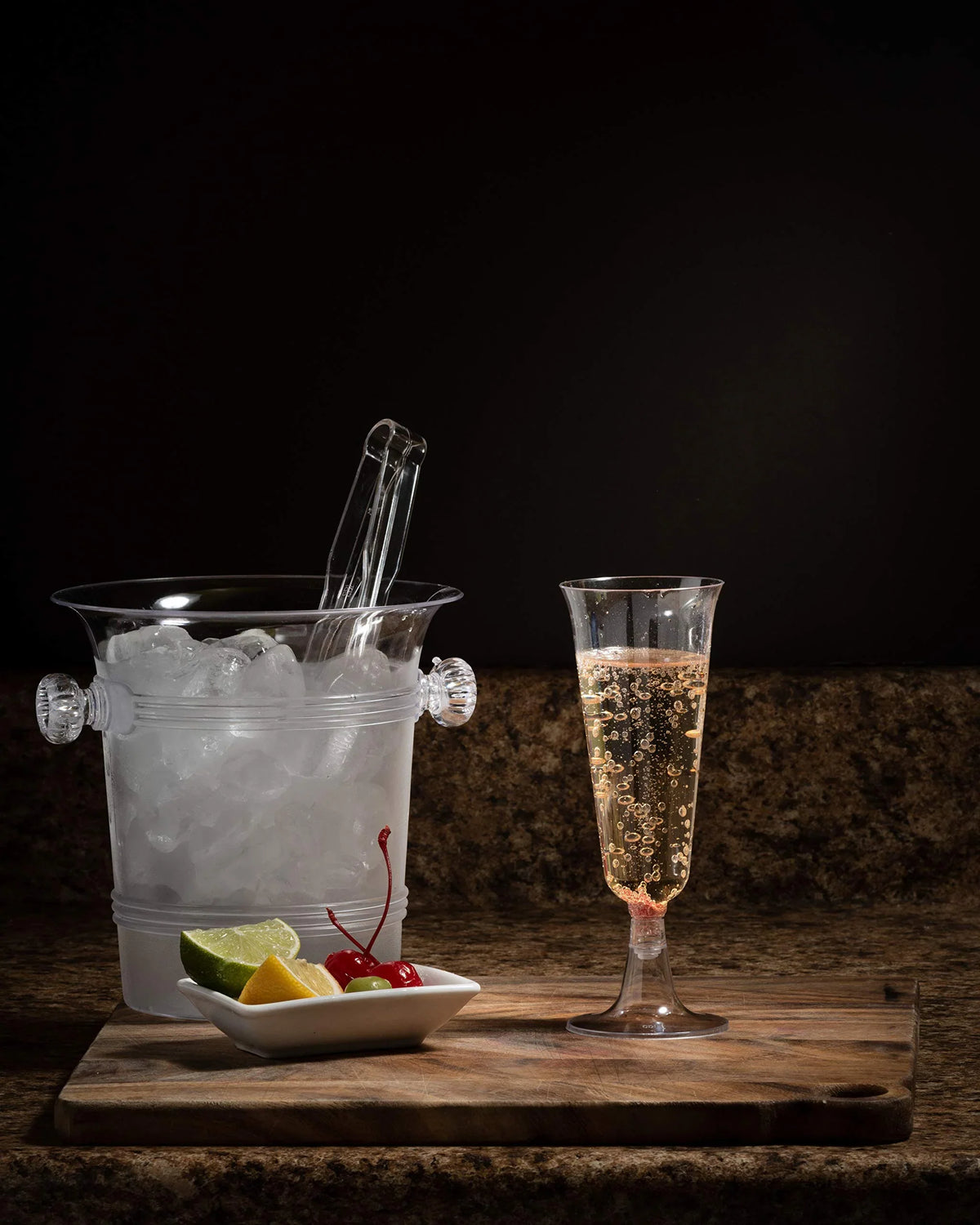
Plastic Cups vs Glass Cups: What to Use at Wedding Receptions
|
|
Time to read 4 min
$6.95 Flat Rate USA shipping (to Continental USA)
SAVE 5% With Code: PARTY5 FREE Shipping from $49.99
Written by: Aslihan Yilmaz
|
|
Time to read 4 min
When planning a wedding or a large event, every detail counts. One important decision is choosing the right material for your drinking glasses.
While glass and plastic are popular options, it can be difficult to decide especially when budget constraints are a factor. In this article, we’ll highlight the pros and cons of plastic glasses and real glassware to make the decision process easier for you.
The best part about real glassware is their elegance and clarity. The clarity of glass enhances the visual appeal of drinks, making them look more enticing. This is especially important for colorful cocktails and fine wines. However, this can also be achieved through decorating your table with plastic glasses.
So, what makes glass so special? 😍
Elegant Appearance: Glass cups exude a timeless elegance that complements the refined atmosphere of weddings or other formal events.
Recyclability: Glass is 100% recyclable without loss of quality or purity. Recycling glass reduces waste and conserves natural resources.
Longevity: Glass drinking glasses, when handled with care, can last a lifetime, reducing the need for frequent replacements.
Non-Toxic: Glass is a natural, non-toxic material. It doesn’t contain harmful chemicals like BPA or phthalates.
Chemical-Free: Glass is a natural, non-toxic material that does not contain harmful chemicals like BPA, commonly found in some plastics.
Clean and Hygienic: Glass is easy to clean and does not retain odors or stains, maintaining a high level of hygiene throughout the event.
Recyclability: Glass is 100% recyclable without losing quality or purity. Choosing glass cups supports eco-friendly practices and reduces the environmental impact of your wedding.
Longevity: Glass cups can be reused for many years if properly cared for, reducing the need for disposable alternatives and minimizing waste.
Breakage Risk: The risk of breaking glass can be a safety concern. However, careful handling and strategic placement can mitigate this risk.
Weight: Glass cups are heavier than plastic, which can be less convenient for serving. Nonetheless, the improved drinking experience often justifies the extra effort.
Cost: Glass drinking glasses are typically more expensive, which can strain your event budget.
Handling and Storage: The heavier weight and fragility of glass can complicate handling and storage, making logistics more challenging.
Just like real glassware, plastic cups also enhance the visual appeal of drinks, making them look more enticing. They come in various designs from cocktail cups to martini cups and flutes to wine cups.
But what sets them apart from real glassware?
There are several pros and cons of plastic barware.
Plastic barware is:
Cost-Effective: Plastic glasses are generally more affordable, allowing you to allocate your budget to other important aspects of your event.
Convenient: Plastic glasses are easy to transport, set up, and clean, ensuring a smooth experience for your event planning and execution.
Chemical-Free: FDP plastic cups are made of BPA-free plastics. This means they are non-toxic and safe to use.
Durability: Plastic is less likely to break, making it a safer option, especially for outdoor use or in households with children.
Lightweight: Plastic glasses are easier to handle due to their lighter weight.
Compact and Space-Saving: Plastic glasses are lightweight and stackable, making them easy to store and transport.
Hygienic and Easy to Clean: Plastic glasses are often designed for single-use, ensuring a high level of hygiene as there is no risk of contamination from previous uses.
Environmental Impact: Plastic glasses can contribute to environmental pollution, especially if they are not recycled properly.
Stain and Odor Retention: Plastic glasses can retain stains and odors from drinks, potentially altering the taste of beverages over time.
Less Elegant Appearance: Some plastic glasses may lack the same level of elegance and sophistication of real glassware. However, you can definitely count on FDP's elegant plastic glasses.
Durability Issues: While plastic glasses are less prone to breaking than glass, they can still crack or become scratched, leading to a shorter lifespan compared to high-quality glassware.
Yes, it's totally acceptable to use plastic glasses at weddings. Especially in outdoor settings, plastic glasses minimize the risk of accidents related to broken glass. Plus, disposable plastic glasses simplify post-event clean-up.
Yes, it's okay to serve wine in plastic cups, especially at large gatherings. Serving wine in plastic cups at a wedding is a cost-effective and safe option. It won't significantly impact the flavor, and besides, the wine isn't meant to be the focal point of the event.
Yes, it is okay to use plastic champagne flutes for a wedding. They are often a practical choice due to their affordability, convenience, and safety, especially at larger events. Modern plastic flutes can look quite elegant and stylish, ensuring that they don't detract from the overall aesthetic of the celebration. Just make sure to choose high-quality plastic flutes to maintain a classy appearance.
Thanks for subscribing!
This email has been registered!